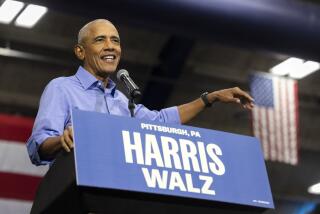Mortgage crisis key in campaign
- Share via
Democrat Barack Obama mocked John McCain on Wednesday for urging government restraint in responding to the mortgage crisis, saying the Republican would “just sit back and watch” as millions of Americans lost their homes.
The back-and-forth between two of the leading White House contenders underscored the emergence of the nation’s home-loan fiasco as a top issue in the presidential race.
Campaigning in Greensboro, N.C., Sen. Obama of Illinois ridiculed Sen. McCain of Arizona for offering no concrete plan to fight the wave of defaults that has shaken the economy.
“We’ve been down this road before,” Obama said. “It’s the road George Bush has taken . . . for the last eight years. It’s the idea that government has no role at all in solving the challenges facing working families -- that all we can do is hand out tax breaks for the wealthiest few and let the chips fall where they may.”
McCain spokesman Tucker Bounds dismissed Obama’s comments as “old attack and smear tactics.”
“John McCain has called for an immediate and balanced approach to provide transparency and accountability in an effort to help homeowners who are hurting, while Barack Obama has made a $10-billion election-year promise that is sure to raise taxes and handcuff an already struggling economy,” Bounds said.
In a Santa Ana speech Tuesday, McCain said that he was open to ideas on weathering the crisis, but that government should not reward banks or small borrowers that had acted irresponsibly.
Obama’s housing agenda includes creation of a fund to help homeowners avoid foreclosure, along with a new mortgage tax credit. Sen. Hillary Rodham Clinton of New York, his rival for the Democratic nomination, has proposed a $30-billion plan to address the crisis.
At the voter forum in North Carolina, Obama also tried to quell the controversy over remarks by his former Chicago pastor, the Rev. Jeremiah A. Wright Jr. The media, Obama said, has zeroed in on the snippets from Wright’s three decades of preaching that speak to racial divisions.
“There are misunderstandings on both sides,” Obama said, according to the Associated Press. “We cannot solve the problems of America if every time somebody somewhere does something stupid, that everybody gets up in arms and forgets about the war in Iraq, and we forget about the economy.”
Meanwhile, former President Clinton told a crowd in West Virginia on Wednesday that the “glitterati” were trying to end the Democratic race before that state’s May 13 primary -- by getting his wife to drop out.
“I know Hillary’s gaining on them when they say, ‘Oh, let’s shut this down now; we don’t want to be divided -- let’s just disenfranchise several of the million people who could vote,’ ” he said, according to CNN.
With some Democrats fretting about potential damage to the party if the primary fight drags into summer, Clinton said that “if a politician doesn’t want to get beat up, he shouldn’t run for office.
“I don’t give a riff about all this name-calling that’s going on,” he added. “They’ve been going on ever since Iowa. I’ve heard them say all these things about her. Apparently it’s OK to say bad things about a girl.”
On another front, some heavyweight Clinton donors griped to House Speaker Nancy Pelosi (D-San Francisco) on Wednesday about Pelosi’s remarks on how superdelegates -- elected officials and party leaders -- should settle the Democratic race.
Obama spokesman Bill Burton called their letter to Pelosi an inappropriate threat to withhold money from Democratic congressional candidates.
The group -- which included Hollywood mogul Haim Saban, Wall Street investment banker Steven Rattner and Esprit clothing founder Susie Tompkins Buell -- faulted Pelosi for saying superdelegates should support the Democrat who wins the most delegates in primaries and caucuses.
“We have been strong supporters” of the Democrats’ House campaign committee, they wrote. “We therefore urge you to clarify your position on superdelegates and reflect in your comments a more open view to the optional independent actions of each of the delegates at the national convention in August.”
Obama leads Clinton in delegates won in primaries and caucuses -- 1,621 to 1,499 -- according to the AP. But it is virtually impossible for either candidate to win enough delegates to capture the nomination, so more than 700 superdelegates will decide the race.
Spokesman Brendan Daly said Pelosi believed “it would do great harm to the Democratic Party if superdelegates are perceived to overturn the will of the voters. This has been her position throughout this primary season, regardless of who was ahead at any particular point in delegates or votes.”
--
More to Read
Sign up for Essential California
The most important California stories and recommendations in your inbox every morning.
You may occasionally receive promotional content from the Los Angeles Times.











